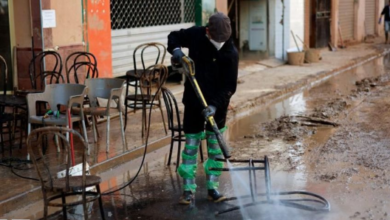China’s metropolis Chengdu extends Covid lockdown, again

Authorities did not reveal when the lockdown will end, saying only that the restrictions would be “dynamically adjusted based on the development of the epidemic and the need of (Covid) prevention and control.”
Chengdu reported 116 infections for Wednesday, bring its total caseload to nearly 1,800 over the past month — a substantial outbreak by the standards of China’s zero-Covid strategy.
“Three days, three days and another three days, when can the lockdown end?” a Chengdu resident wrote on Weibo, China’s Twitter-like platform.
Some districts have banned the online delivery of what they described as “non-daily necessities,” including tea, coffee, hotpot and barbeques. Cafes, bakeries and barbeque joints were also ordered to close, according to government notices.
Widespread lockdowns
Across China, local authorities are under immense pressure to stamp out infections at any cost in the final countdown to a Communist Party meeting in October, when leader Xi Jinping is expected to secure a norm-breaking third term in power.
More than 70 cities have been placed under full or partial Covid lockdowns since late August, affecting more than 300 million people, according to a CNN tally.
As of Wednedsay, China has 1,604 high-risk areas, 1,730 medium-risk areas, and 309 low-risk areas, according to the country’s National Health Commission. The size of a risk area can vary from a shop to a whole residential compound. People in high-risk areas are strictly banned from leaving their homes, and those in medium-risk areas are confined to their compounds.
In some cities, authorities appear unprepared for the lockdown, causing severe food shortages.
Guiyang, capital of southwestern Guizhou province, placed its main districts under a four-day lockdown on Monday, after reporting 132 cases. By Wednesday, many Guiyang residents had turned to social media to call for help for food shortages.
The situation appeared particularly severe in Huaguoyuan, a mega apartment complex home to around 400,000 residents, according to state media. Posts circulating on social media show screenshots of residents pleading for food, with some claiming they have been starving for three days.
The local government acknowledged the issue and apologized for the lack of supplies in a statement on Wednesday. “Affected by the epidemic, our residents…have faced difficulty in procuring daily necessities. We’re trying our best to solve the issue,” the Nanming district government said.
Yang Rui, a Huaguoyuan resident, said she received supplies from the government on Thursday morning, but many others have yet to receive them. “Supplies and personnel are both limited, it’ll have to take some time,” she said.
Guiyang is home to Apple’s Chinese data center. Guizhou-Cloud Big Data, which built the data center with Apple, said in a letter to staff published on the company’s official WeChat account: “To ensure the provincial covid prevention system runs smoothly, many of us are staying here in our post. (Staff) has not gone home even once for an entire week, nor did they get a full sleep throughout the week.”
CNN has reached out to Apple for comment on the ongoing lockdowns in Chengdu and Guiyang.
In Shanghai, guests at the Disney hotel were hit by a two-day lockdown on Wednesday, after authorities found that a former guest at the hotel had been in close contact with a Covid patient.
And in Beijing, authorities are scrambling to curb an outbreak centered on university campuses. The city reported 14 local infections for Tuesday and 10 infections for Wednesday.
Nationwide, China reported 1,439 new infections on Wednesday, according to the National Health Commission.
CNN’s Alex Stambaugh contributed to reporting.
[ad_2]Source link





